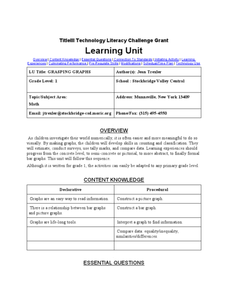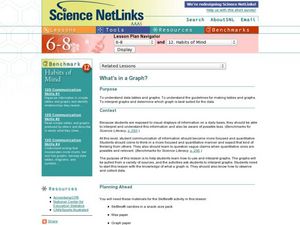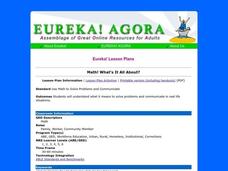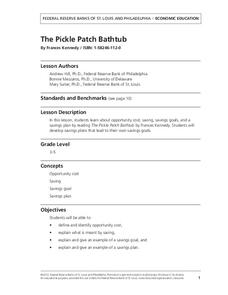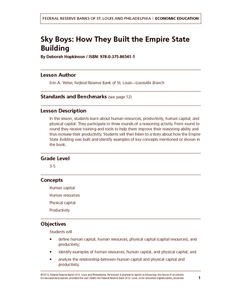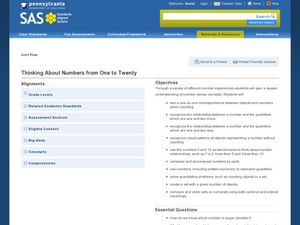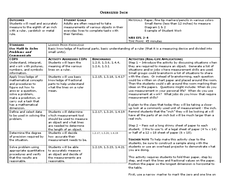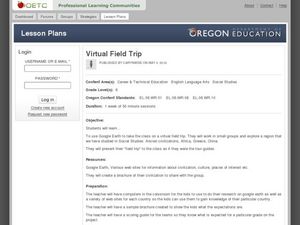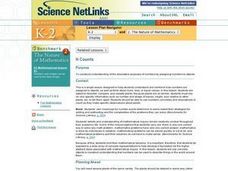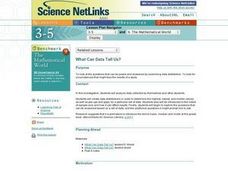Federal Reserve Bank
Your Budget Plan
What do Whoosh and Jet Stream have in common? They are both characters in a fantastic game designed to help students identify various positive and negative spending behaviors. Through an engaging activity, worksheets, and...
Federal Reserve Bank
So How Much Are You Really Paying for that Loan?
Loans are rarely provided without a cost. Pupils evaluate the high cost of using a payday loan or payday advance through discussion and worksheets, and finally work in groups to develop short public service announcements...
Ohio Literacy Resource Center
Solving Systems of Linear Equations Graphing
Do you need to graph lines to see the point? A thorough lesson plan provides comprehensive instruction focused on solving systems of equations by graphing. Resources include guided practice worksheet, skill practice worksheet,...
Federal Reserve Bank
To Rent-to-Own or Not to Rent-to-Own?
Explore the key elements of a contract with your young adults, and delve into the features and unique benefits of a rent-to-own contract through discussion and worksheet practice.
Curated OER
Technology Literacy Challenge Grant Learning Unit
First graders explore counting and classification. They sort leaves, create graphs, write sentences for the data in the graphs, develop graphs for shapes, favorite animals, birthdays, and participate in a die prediction game.
Federal Reserve Bank
Cash the Check and Track the Dough
From checking and savings accounts to learning the importance of maintaining records and balancing a bank account, prepare your young scholars to become financially independent and savvy adults, and explore all the intricacies of owning...
Curated OER
What's in a Graph?
How many yellow Skittles® come in a fun-size package? Use candy color data to construct a bar graph and a pie chart. Pupils analyze bar graphs of real-life data on the Texas and Massachusetts populations. As an assessment at the end...
Curated OER
Math! What's It All About?
Twelfth graders determine what procedures they use to solve a problem and what areas of math they have difficulties with. In conjunction with their GED preparation, 12th graders review various ways to complete math problems and achieve...
Federal Reserve Bank
The Pickle Patch Bathtub
What do your pupils want to save up their money for? Based around the book The Pickle Patch Bathtub, this lesson covers opportunity cost, saving, and spending. Learners participate in a discussion and practice making their own...
Federal Reserve Bank
Sky Boys: How They Built the Empire State Building
How tall is the Empire State Building? Lead your class through a collaborative estimation activity to determine the number of quarters it would take to reach the top and teach the following concepts: human capital, human resources,...
Curated OER
What Can Data Tell Us?
Students analyze data they have collected themselves and by their classmates. In groups, they create data distributions to identify the highest, lowest and middle values. As a class, they discuss the concept of sample size and how it can...
Curated OER
Measuring Objects in the Classroom
Third graders use ruler and tapes to measure classroom objects. After discussing measurement tools, have students complete sentences stating what they would use to measure various objects. Later in the computer lab, they type their...
Pennsylvania Department of Education
Thinking About Numbers from 1 to 20
Help your kindergarteners discover new number-sense concepts and to compose and decompose numbers. Though the resource contains no procedural details, the assessment tool (which you can find in the "printer friendly version") has...
Curated OER
A Lesson to Accompany "Benjamin Franklin and the Birth of a Paper Money Economy"
Students examine the role of money in the colonial economy by participating in a trading activity. In this colonial economy lesson plan, students complete an activity to learn about colonial trade and what happens when there is a lack of...
Curated OER
Oversized Inc
Fourth graders become familiar with fractional parts of a ruler. In this measurement lesson, 4th graders measure various objects to an 1/8 of an inch. Students measure a piece of paper based on teacher direction....
Curated OER
Candy Land
In this activity students pretend that they have been hired by a candy manufacturer to design a box for a new product they are beginning to market. The manufacturer has pre-determined the volume of the candy box. It is the students' job...
Curated OER
Virtual Field Trip
Are we there yet? Young trip planners learn about their state and plan a trip. They will select sites to see in three cities in their state, and record associated costs in a spreadsheet. While this was originally designed as a...
Curated OER
Math: Perimeter, Area, and Volume
Eighth graders discover how to compute the perimeter, area, and volume of different objects. With partners, they find and calculate the perimeter , area, and volume of 10 items each and exchange information. Students compile their...
Curated OER
It Counts
Students classify and compare plants using specific information, observations, and numbers. In this mathematical inquiry lesson, students use plant characteristics to describe, compare, and classify them. They attempt to develop a system...
Curated OER
Bias Sampling
Students demonstrate how the results of a poll or other scientific study can be biased by selecting special types of people to respond or by asking only certain questions.
Curated OER
Bias Sampling
Students explore statistics by conducting a scientific study. In this data analysis lesson, students conduct a class poll about popular foods of their classmates. Students complete a worksheet and discuss how bias opinions affect the...
Curated OER
It Counts
Young scholars explore one to one number correspondence. In this early math lesson plan, students make observations about and classify plants in order to gain an understanding of using numbers to describe their world.
Curated OER
It Counts
Students explore how numbers can identify objects. In this math activity, students determine how numbers are used to describe objects used in quantitative data collection.
Curated OER
What Can Data Tell Us?
Students explore data distribution. In this data analysis lesson, students create a data distribution table by playing the game "Tower of Hanoi" from the Hall of Science. Students analyze their data and answer data driven questions.






